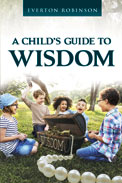
 |
Robinson has created a manual for the memorization and internalization of fifty significant wisdom statements. His guide is designed to be utilized by parents in their efforts not only to educate but to elucidate important, spiritually based principles to their children. These are principles by which any person can structure a rational, decent plan for all aspects of living. The statements composed by Robinson treat with such diverse but crucial character aspects as creativity (“finding new ways to get things done”), transparency (“being the same person in public that you are in private”), mentorship (“learning from another person’s experience”), passion (“doing what you do with all your heart”), edification (“building another person up”), and wisdom (“knowing what to do and doing it when you are supposed to do it; and knowing what not to and NOT doing it”).
The quality statements are given in alphabetical order, ranging from accountability to work ethic. Each statement comprises a page on its own. Below each of the statements that the child or student is to memorize are the following components: a Wisdom Payment Chart that states how much the student will earn each time he or she quotes the principle from memory (for example, 5¢, 10¢, 25¢); the numbers 1 to 21 to be circled by the adult to record the number of times quoted; a certification to be signed by the adult (parent, monitor, or teacher) that allows for a pre-agreed monetary bonus for the student after he or she recites the principle from memory 21 times. The manual begins and ends with a relevant biblical quotation.
Robinson’s system appears both practical and beneficial for anyone who undertakes it. His writing is intelligent, straightforward and immediately accessible to the average reader. His book is also notably well-organized. Basing his unique methodology around the statement quoted above, he has chosen the number 21 as optimal to ensure true memorization and “to motivate the child.” Offering a small payment for single, numerous repetitions and a bonus for accurately repeating the principle 21 times in total gives the child a goal to work towards.
Robinson’s statements are carefully couched in plain language that even younger children can grasp, such as the definition of humility: “not making a big deal of yourself.” For the skeptical, the author helpfully includes some personal success stories. He recounts that his two daughters, who were his “test cases,” initially were able to recite the principles by rote memory, but as they matured, the understanding of the principles also began to seep in, and “the meaning became clearer and clearer.” The simple, individual statements became for them the foundation of a true philosophy of life. This is the result he hopes for among his readership.
Robinson is an ordained deacon of the African Methodist Episcopal Church and also an investment advisor who has made a personal study of business success and engages in e-commerce. His method of helping youngsters attain wisdom as put forth in this bold new book is both attractive and workable; one is tempted to call it “child’s play” leading to adult behavior. It could serve as an inspiration to parents wondering how to raise children in an age of moral confusion, focusing back on simple religious and ethical principles that endure.
RECOMMENDED by the US Review